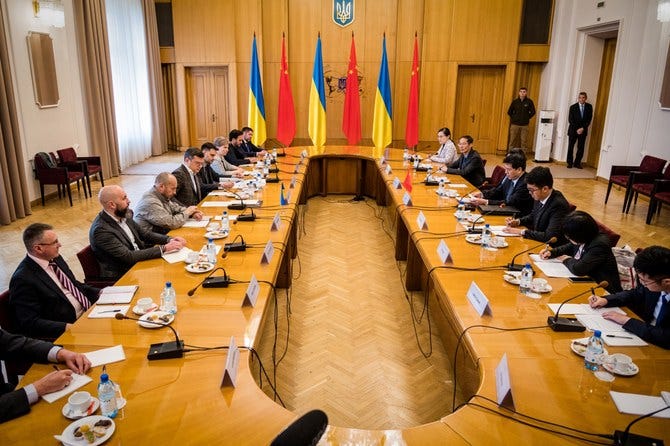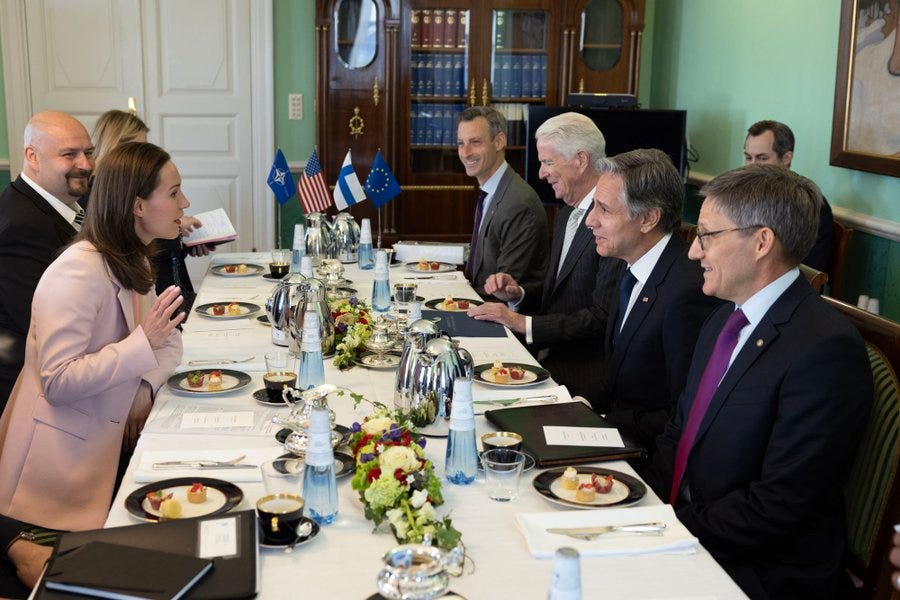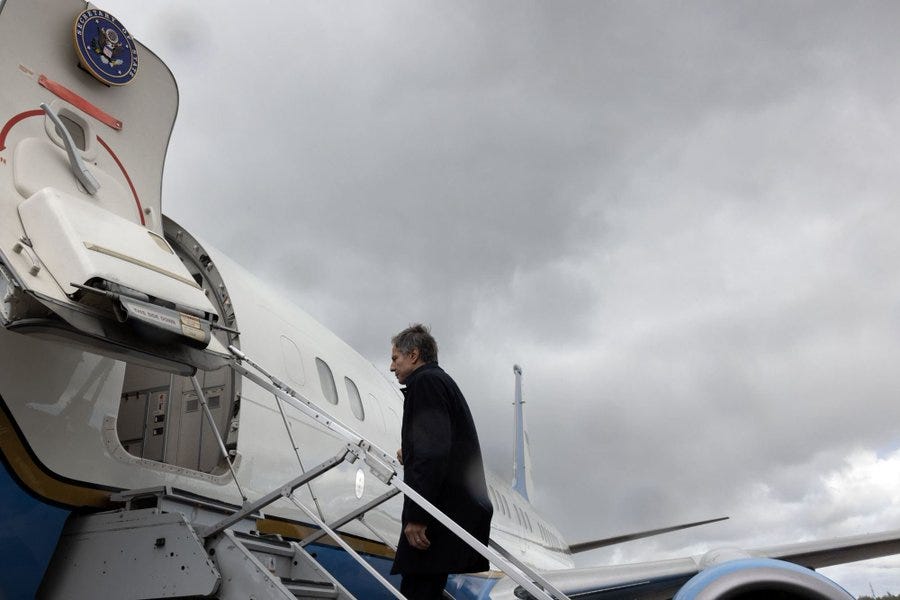Jun 5: Missy Ryan, U.S. rebuffs cease-fire calls in its strategy for Ukraine resilience
As published in The Washington Post on June 3, 2023
U.S. rebuffs cease-fire calls in its strategy for Ukraine resilience
By Missy Ryan, The Washington Post, June 3, 2023
Proposals to impose cease-fires or territorial concessions as means to halt the war in Ukraine would serve only to legitimize President Vladimir Putin’s aggression and encourage future assaults, Secretary of State Antony Blinken said Friday as he laid out U.S. strategy for hardening Ukraine against long-term Russian threats.
Blinken, in what officials described as a signal address in the Finnish capital, made a case for Putin’s massive “strategic failure” in Ukraine, a debacle he said has isolated Moscow, weakened its economy and exposed the weakness of Russia’s once-feared military.
He delivered the speech ahead of an effort by Ukrainian President Volodymyr Zelensky’s forces to recapture Russian-controlled territory in a new offensive, while President Biden seeks to head off any erosion of Western support for Kyiv’s existential fight.
Putin’s February 2022 invasion has upended decades of stability in Europe and inflicted staggering losses on Ukrainian civilians and troops from both sides. It has also sent shock waves worldwide, worsening food insecurity and injecting a new, unpredictable element into the great-power standoff.
Amid growing calls for a mediated peace from nations such as China and Brazil, Blinken also laid out principles for what he termed “a just and lasting peace.” Among those principles, he said, are Ukraine’s territorial integrity, Russian reparations and accountability for war crimes.
He rebuffed calls for cease-fires or concessions of Ukrainian land in any “land for peace” formulas, prospects he said would represent a “Potemkin peace.”
“A cease-fire that simply freezes current lines in place — and enables Putin to consolidate control over the territory he has seized, and rest, rearm, and re-attack — is not a just and lasting peace,” Blinken said. “It would legitimize Russia’s land grab. It would reward the aggressor and punish the victim.”
Blinken said the United States would support negotiations “if and when Russia is ready to work for true peace.” While the Biden administration has at times nudged officials in Kyiv to show greater openness to negotiations, it has said it will not pressure them to jump-start talks by offering concessions. Those decisions belong to Ukraine alone, U.S. officials have said.
“Along with Ukraine and allies and partners, we would be prepared to have a broader discussion on European security that promotes stability and transparency and reduces the likelihood of future conflict,” Blinken said.
Blinken did not specify whether the United States would support some kind of different process for Crimea, the Ukrainian peninsula that Russia has occupied since 2014, or insist on a full, immediate withdrawal from Crimea along with areas seized following the 2022 invasion.
Officials billed the speech as a blueprint for America’s long-term strategy for Ukraine and a counterpoint to a 2018 meeting that President Donald Trump held with Putin in Helsinki. There, Trump sided with Russia against U.S. intelligence agencies’ assessments that Moscow had interfered in the 2016 U.S. presidential election. It was a potent symbol of Trump’s friendly approach to Moscow, a sharp contrast to Biden, who has described Putin as a “killer” and spent much of the past two years seeking to force him off the world stage.
The setting for Blinken’s address was intended to highlight the changes that Russia’s invasion has brought to Europe, including Finland’s decision to abandon longtime military nonalignment to join the NATO alliance. While Finland formally entered the Western bloc in April, neighboring Sweden’s membership is on hold until it is ratified by holdouts Turkey and Hungary.
The addition of both well-armed Nordic nations will represent an asset to NATO as it seeks to harden Europe’s eastern edges against Russia and signal its readiness to rebuff any future attack.
Blinken referenced Finland’s 1939-1940 Winter War with the Soviet Union, saying that Moscow — both then and in its 2022 Ukraine invasion — had invented a provocation to justify its plans and then wrongly anticipated a quick victory before resorting to targeting civilians.
While officials said the speech was not intended to preempt the possibility that Western support for Ukraine might diminish if Kyiv fails to make substantial gains in its spring offensive, public opinion is divided in many NATO nations. In the United States, while backing for the war has subsided most dramatically among Republican voters, congressional leaders of both parties remain strongly in favor of U.S. aid.
Blinken’s Helsinki address followed a meeting of NATO foreign ministers in Oslo, where officials referenced their support for Ukraine’s eventual membership in the alliance but announced no new steps toward Kyiv’s accession. That prospect has divided NATO members between countries that support Ukrainian membership and those that worry that it might trigger Russian backlash.
In the meantime, Washington and its NATO allies are developing plans for long-term defense pacts with Ukraine that would lock in future military aid and possibly formalize commitments for mutual defense.
The United States has already provided Ukraine nearly $40 billion in security aid since Putin’s full-scale invasion. But Blinken said more is needed to effect a lasting transformation, including construction of a modern air force, cohesive air and missile defenses, advanced ground weapons and a strong domestic arms industry.
He said the United States would also seek to ensure a stronger democracy and flourishing economy for Ukraine.
“The path to peace will be forged not only through Ukraine’s long-term military strength, but also the strength of its economy and its democracy,” he said. “This is the heart of our vision for the way forward: Ukraine must not only survive, but thrive.”
Much of the speech focused on laying out what Blinken characterized as Putin’s mistakes and failed assumptions on Ukraine.
“Russia is significantly worse off today than it was before the full-scale invasion,” Blinken said. “Where Putin aimed to project strength, he has revealed weakness. Where he intended to divide, he has united.”
But Russia’s economy has proven more resilient than Western nations had hoped, at least so far. And, despite staggering human losses, Putin appears willing to continue to send Russian men into the fight.
While Blinken cited global condemnation of Russia, the Biden administration has struggled to secure such denunciation from much of the Global South, as countries with economic and historic or security ties to Russia seek to remain on sidelines.
Blinken said he believes that Putin’s isolation has made an impression on China, which earlier this year issued a proposal for peace in Ukraine that included a cease-fire and an end to sanctions on Russia. More recently, other leaders including Brazil’s Luiz Inácio Lula da Silva have attempted to position themselves as potential peacemakers in the conflict.

The Biden administration has been grappling with a series of flare-ups in its long-running tensions with China, in part due to U.S. concerns about the potential for a Chinese military operation to seize control of Taiwan.
A senior Chinese diplomat called Friday for countries to stop providing weapons to prevent the conflict from escalating, after concluding a 12-day tour of European capitals intended to position China as a potential mediator.
“We believe that weapon supply to the battlefield should cease if the war is to stop, lives are to be saved and peace is to be realized, otherwise the risk of spiraling tensions will only increase,” Li Hui, China’s special representative for Eurasian affairs and point-man leading Beijing’s peacemaker efforts, told reporters in Beijing.
While acknowledging difficulties preventing talks from progressing and a “stalemated battlefield rife with uncertainty,” Li underscored China’s position that a political settlement could be reached. “In reality, China and the [European Union] are often in agreement on the Ukraine crisis,” he said.
Christian Shepard in Taipei, Taiwan, contributed to this report.







